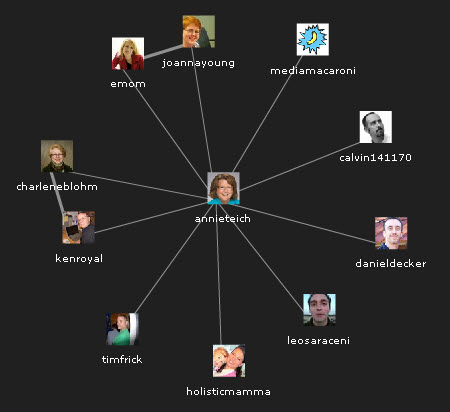The LANGUAGE of SOCIAL MEDIA
Words have a deep effect on
how we interpret and interact with the world.
The words we use and how we define them
reveal our interests, concerns, and values.
This series explores the words of social media.
social media friend
Traditionally friend denotes a co-operative relationship that includes supportive action usually based in knowledge, respect, loyalty, and some availability in times of stress or crisis. Friendship can grow from participating in common activities, spending time in common work or study spaces, and usually involves discovering common values. A friend protects and looks out for a friend. Honesty and some degree of intimacy are hallmarks of friendship.
In any situation, the quality of “friend” depends on the reason for connecting, the situation, the longevity of the existing relationship, and the sophistication of the people in the relationship.
Linking up on a social networking site is is often called “friending,” as in Liz wants to be your friend. Those we connect with instantly become our “friends” in that network database. These can be non-personal friends, such as when two countries enter into an agreement for political purposes and international relations. Connections made to extend a network’s reach might be seen in this light.
Relationships online also rise to the level of personal friendship. The values of the social web — authenticity, honesty, transparency of purpose, and trust — make it natural for like-minded people to become friends in a real sense. Many people in social media overlook the term and hold friend to a higher meaning than a non-personal connection.
A growing number of meetings in person has added to this complex situation. In a simple, nonscientific social survey Twitter users answered this question this way. We seem to be drawn to meeting those we friend online.
What percent of all your friends are online friends only
— you’ve never met in person?
less than 20% 28 responses(43.75%)
20-40% 7 responses (10.94%)
40-60% 11 responses (17.19%)
60-80% 9 responses (14.06%)
more than 80% 9 responses (14.06%)A totally equal distribution would be 20% in each response section.
In this 64 person group, it seems that once we cross the middle we quickly continue converting online friends into people we know in person.
Here’s how some folks define their online social media friends.
@deeped: “that X-factor in conversations – that makes you feels comfortable and interested”
@johnprew: “Perhaps its’ one who you’ve never met face to face but share your souls in what you share online and enjoy the mutual exchange.”
@sra_nelson: “I’ll usually just say they are my real friends I haven’t met in person yet.”
@debrasnider “Just as IRL, someone interesting who tells you the truth, listens to you, supports you & for whom you gladly do the same.”
@miraclady: “I have not met 90% of my commentors on my blog -less on Twitter. Still, there is such a connection. We know each other.”
@timbursch ” I think the tough part is trust. Trust that this person is who they say they are…”
@workhappynow: ” I define a friend in social media as someone who will offer help when I struggle. If he is a fair weather friend then he is cut.”
For more information see:
Princeton WorNet
Wiktionary
Friend / Friendship
Non-personal friendships
Etymology and definition of the term “community”
Friendship Network
Non-personal friendships
SEE ALSO:
What Is Social Media?
What Is Social Networking?
What IS a Social Community?
Got more to add? C’mon let’s talk.
–ME “Liz” Strauss
Work with Liz!!
